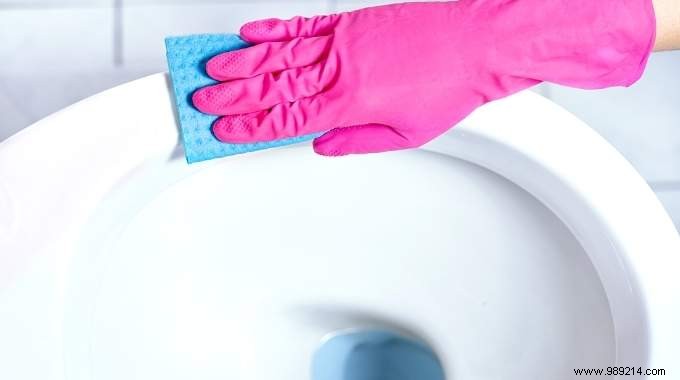
I don't know about you, but I used to wash toilets with bleach.
And one day I learned that it was a big mistake to do that.
And apparently, many of us do!
Truth be told, it's a useless, ineffective, even dangerous habit.
Indeed, not only is this product toxic and bad for your health ...
But in addition, it is not at all suitable for cleaning toilets . Here's why:
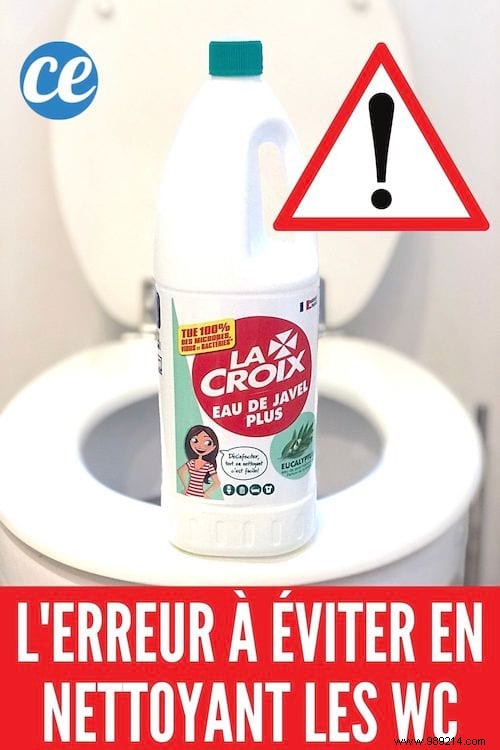
Let me tell you a good thing. Bleach does not clean !
Surprising, isn't it?
Bleach is a very effective detergent for whitening, bleaching and disinfecting.
It is indeed an excellent whitening and disinfectant.
But we cannot say that it cleans. Why?
Quite simply because it does not contain surfactants.
And it is these elements that make it possible to clean a surface.
What does this mean for you?
Concretely, when you pour bleach in the toilet, you are content to whiten the encrusted limestone.
True, the bowl turns white. But the limestone is still there.
As it turns white, you feel like it's clean. But it's not.
Limestone all cracra is still very present (well hidden under its white color).
Very quickly, you will find ugly yellow or brown marks at the bottom of the bowl.
And this, from the first uses!
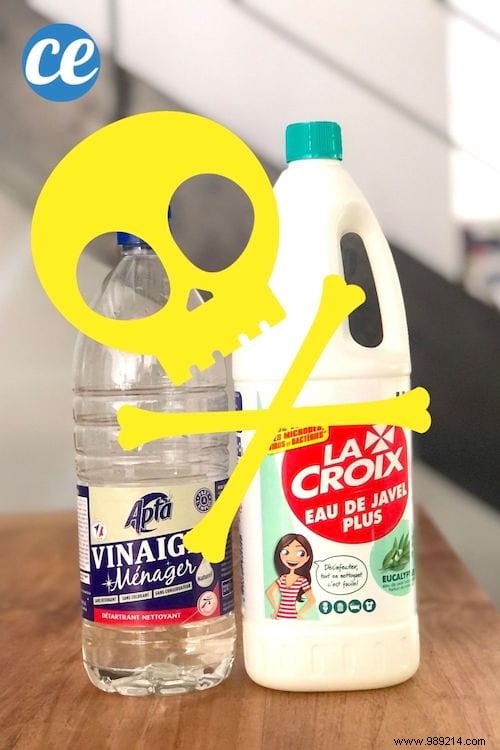
But that's not all.
Becausebleach is not safe for your health. Far from it!
Bleach is made up of chlorine and a potash solution. It's sodium hypochlorite.
If you get it on your hands, you can seriously burn your skin.
And it's much worse if you get it in your eyes.
So of course, you're going to tell me that bleach can be handled with care.
Especially with gloves and goggles.
But even with all these precautions, bleach can be dangerous.
So what are the risks? Let's see it together!
Cécile Pebay, chemist at the CNRS chemical risk prevention, reveals that if the bleach comes into contact with ammonia acid, it creates toxic gases:
"Chloramine and dichlor are very irritating gases for the respiratory tract and the eyes", she specifies in a report by La Quotidienne on France 5.
The problem is that most household products contain acid or ammonia.
And bleach + ammonia =toxic gases.
So it is strictly not recommended to use bleach with another cleaning product.
But that's not all. You may already know:urine is rich in ammonia.
If it comes into contact with the bleach, dangerous gases can therefore be released.
You must therefore ensure that your toilet is absolutely clean before pouring bleach into it.
Which is both paradoxical and impractical...
And the icing on the cake is that bleach should NEVER come into contact with white vinegar.
It is also very dangerous.
This is not a scoop:white vinegar is a very acidic product composed of acetic acid.
Do you know what I mean?
Bleach + acetic acid =toxic gases.
In summary, bleach should not be mixed with household cleaning products, drain cleaners and white vinegar.
Know one more important thing:
The toxic gases created by mixing bleach and ammonia or bleach and acetic acid are chloramine and dichlor.
These toxic gases do not disappear over time.
They continue to pollute the indoor air of your home for a very long time:we are talking here for many years...
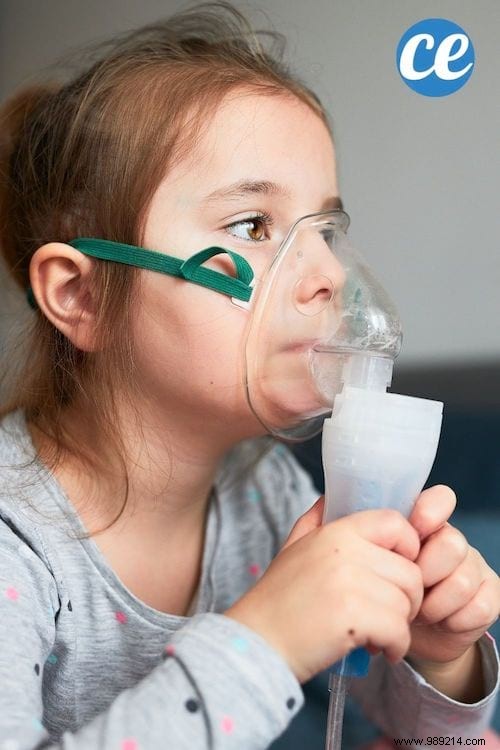
Unfortunately, these are not the risks do not weigh only on bleach users.
Even children are concerned!
Published in 2016 in the journal Occupational and Environmental Medicine, a scientific study highlights a significant risk of respiratory and ENT infection in children 6 to 12 years of age with regular use of bleach..
"The high frequency of use of cleaning and disinfecting products caused by the mistaken belief - reinforced by advertising - that our homes should be germ-free, produces the effects reported in our study.
It is a public health problem" explained Lidia Casas, one of the researchers who worked on this study, in Ouest-France.
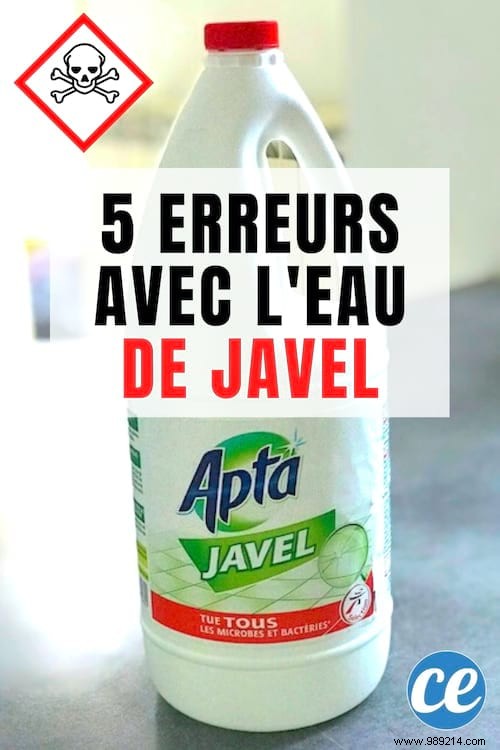
Another problem related to the use of bleach...
With the coronavirus pandemic now raging for many months, anti-poison centers have noted an increase in cases of poisoning and household accidents related to bleach.
It must be said that bleach is a virucide effective and that it destroys the coronavirus.
But it must be used sparingly and with caution to avoid any risk of poisoning!
Fortunately, there are other options for safely eliminating the COVID virus on a daily basis.
To discover: Coronavirus:5 Mistakes Everyone Makes With Bleach.
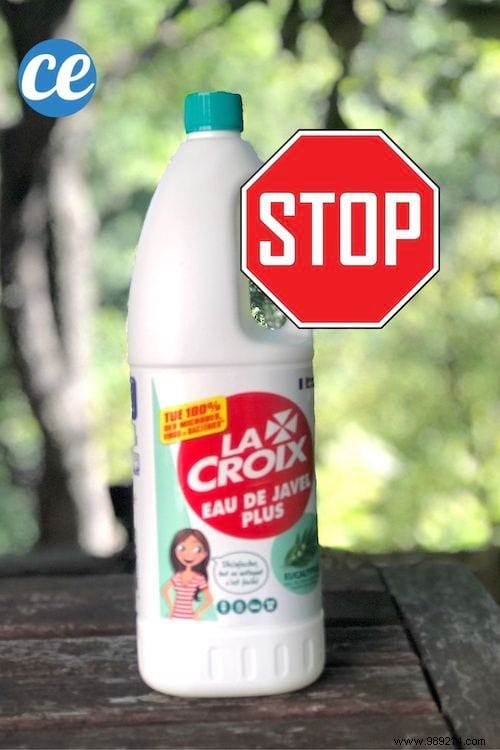
And icing on the cake...
Bleach not only endangers our health and that of our pets, but also nature.
It is one of the worst enemies of the environment .
Just pour it into the toilet for it to be evacuated in the pipes and ends up in the waste water.
It evaporates and turns into organochlorines.
What is this stuff, you ask me?
They are neurotropic toxins that contaminate the air and the earth.
Moreover, if you have a septic tank at home, it is completely inadvisable to use bleach to clean your toilets.
The bleach will literally kill the bacteria in the pit.
And it is thanks to these bacteria that your pit works properly.
If there are no more, it becomes ineffective.
And there, hello galley! Better to choose a product compatible with a septic tank.
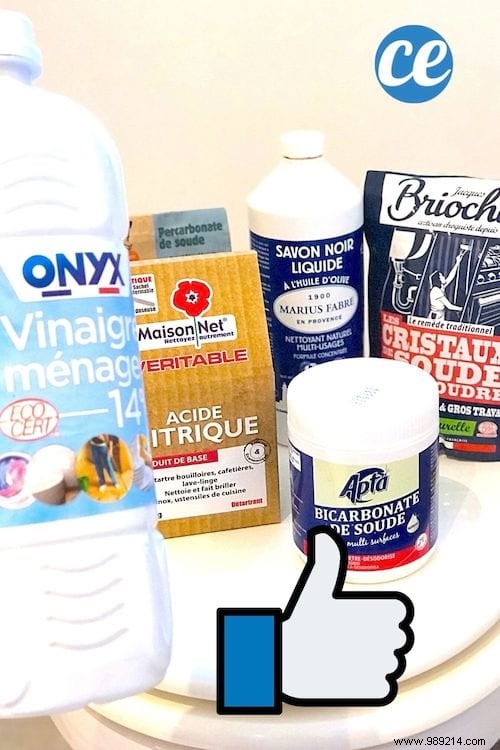
You have understood it, the use of bleach in the toilets is not recommended.
That doesn't mean you shouldn't clean your toilet. On the contrary!
So, how to eliminate limescale in the toilet?
Let's see together what are the possibilities for cleaning toilets and removing limescale without bleach .
Rest assured ! There are plenty of natural alternatives:
- with white vinegar
- with white vinegar and baking soda
- with soda crystals
- with black soap and white vinegar
- with sodium percarbonate
- with citric acid
You see, you are spoiled for choice!
All these solutions are natural and effective.
You will thus really attack the limestone, eliminate it and prevent its reappearance.
And at the same time, you clean your toilets thoroughly without endangering yourself.
In case of chlorine inhalation, you must contact a poison control center, the emergency room or a doctor very quickly.
While waiting for help, the victim must be taken out into the open air and given some rest.
Symptoms of poisoning are:
Eye irritation, irritation of the upper respiratory tract (nose, pharynx) with pain when breathing, cough, dyspnea, nausea and vomiting, and even cyanosis, edema of the glottis and laryngeal spasm.
In case of eye contact: you must rinse thoroughly for 15 to 20 minutes while keeping your eyes open, remove the lenses and call the poison control center.
In case of skin contact: you must remove the soiled clothes and rinse with plenty of water for 15 to 20 minutes. Contact emergency or a doctor in case of burns.
If swallowed :Call the poison control center or emergency room. Do not induce vomiting unless recommended by a healthcare professional. Do not give him anything to eat or drink unless advised by a healthcare professional.